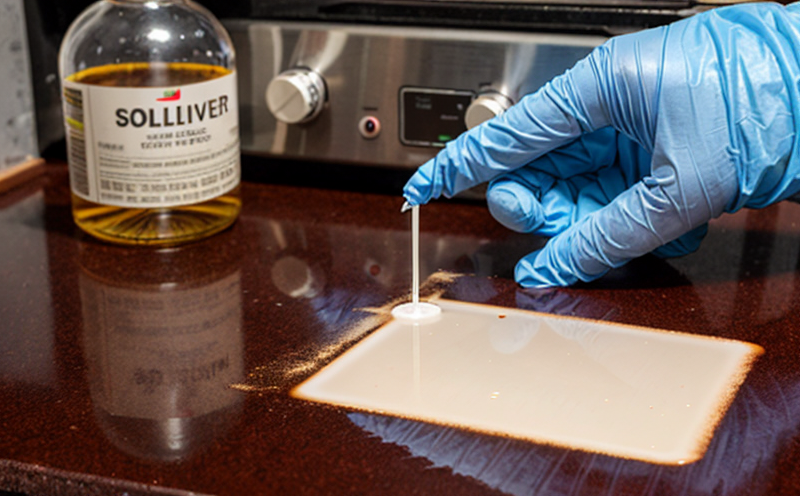Beverage Solvent Residue Testing
Beverage solvent residue testing is a crucial aspect of quality assurance in the beverage industry. The presence of solvents or their by-products can significantly impact product safety, quality, and consumer confidence. This service ensures that beverages meet stringent regulatory requirements and consumer expectations. Regulatory bodies such as the Food and Drug Administration (FDA), the European Union's Codex Alimentarius Commission, and others have established guidelines to prevent harmful substances from entering the food chain.
Eurolab specializes in providing comprehensive beverage solvent residue testing services using cutting-edge analytical techniques. Our laboratory adheres strictly to international standards such as ISO 17025, ensuring accurate and reliable results. The process involves meticulous sample preparation, analysis with advanced instrumentation, and detailed reporting of findings.
The primary focus is on identifying solvents like methanol, ethanol, acetone, and others that may be present in beverages due to contamination or improper processing. These residues can pose health risks if not managed properly. For instance, high concentrations of certain solvents could indicate poor quality control processes or deliberate adulteration. By offering this service, Eurolab helps beverage manufacturers maintain high standards of safety and integrity.
Our team of experts employs rigorous methodologies to ensure precise detection levels down to parts per million (ppm). This level of accuracy is vital for maintaining compliance with international regulations. Additionally, we provide comprehensive reports that include detailed information on the types of solvents detected along with their concentrations. These insights enable manufacturers to identify potential issues early and take corrective actions promptly.
Regulatory requirements vary by country but generally aim at preventing harmful contaminants from entering the food supply chain. For example, in Europe, Directive 2017/625 on food contact materials specifies limits for certain solvents used during production. By adhering to these standards and providing reliable testing results, Eurolab contributes significantly towards ensuring compliance.
Moreover, our services extend beyond mere detection; they also offer valuable recommendations aimed at improving overall quality assurance practices within beverage companies. These recommendations are based on extensive experience gained from analyzing numerous samples across different industries.
Industry Applications
- Beverage producers seeking to ensure product safety and compliance with regulatory standards.
- Manufacturers looking to enhance their quality assurance processes through regular solvent residue testing.
- R&D teams aiming to identify potential sources of contamination in new formulations.
- Procurement departments ensuring suppliers meet specified criteria regarding the use of solvents during production.
Eurolab Advantages
At Eurolab, we pride ourselves on offering unparalleled expertise and reliability when it comes to beverage solvent residue testing. Our team comprises highly qualified professionals with extensive experience in the field. They stay updated with the latest technological advancements and methodologies, ensuring that our clients receive state-of-the-art services.
We operate under strict quality assurance measures guaranteed by ISO 17025 accreditation. This certification demonstrates our commitment to delivering accurate, repeatable results consistently across all tests performed within our laboratory environment. Our advanced instrumentation includes gas chromatography mass spectrometry (GC-MS), liquid chromatography mass spectrometry (LC-MS/MS), and other relevant equipment capable of detecting even trace amounts of solvents.
Our commitment extends beyond just meeting regulatory requirements; it also involves providing actionable insights that can help improve manufacturing processes. We work closely with our clients to understand their specific needs and tailor our services accordingly, ensuring they receive the most valuable information possible from every test conducted.
Use Cases and Application Examples
Beverage solvent residue testing finds application in various scenarios within the industry:
- New Product Development: During R&D stages, manufacturers often need to ensure that new formulations do not contain any unintended solvents. Eurolab can help identify these contaminants early on so necessary adjustments can be made before production begins.
- Supplier Audits: Regular solvent residue testing of raw materials or ingredients sourced from suppliers helps maintain consistent quality throughout the supply chain. Any discrepancies are promptly addressed, ensuring compliance with both internal standards and external regulations.
- Quality Control: Continuous monitoring during production ensures that no unwanted solvents end up in finished products. This proactive approach prevents potential recalls and associated costs while enhancing brand reputation.
In summary, Eurolab's beverage solvent residue testing service plays an integral role in safeguarding public health, maintaining product quality, and fostering trust between manufacturers and consumers alike.





